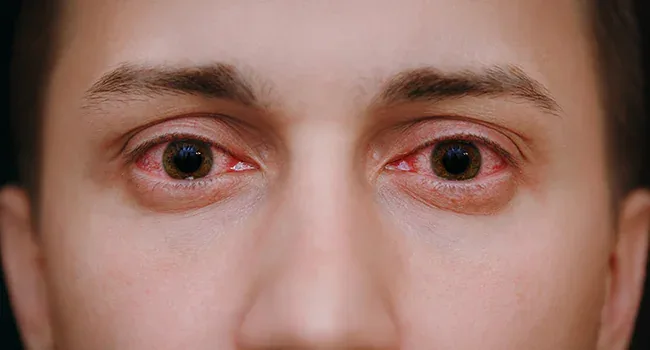All of us have experienced the burning and redness of the “swimmer’s eye” after swimming. However many of us have heard that excessive chlorine can result in a swimmer’s eye infection, but that is only part of the story. Swimmer’s eye is frequently a mix of disruption of the tear film (dry eyes) and chemical conjunctivitis (irritation) brought on by unsuitable swimming techniques and chlorine. Conjunctivitis and swimmer’s eye symptoms can include discharge, swollen eyelids, blurred vision, burning, itching, redness, and irritation.
Why do my eyes get red and have eye irritation after Swimming in a Pool?
After floating in the water for a while, it’s usual for your eyes to become slightly red and irritating. Although many attribute it to the water’s high chlorine concentration, that’s not quite the case. The issue is actually caused by urine & sweat in the water, according to the Centers for Disease Control and Prevention (CDC). Swimming pools are cleaned with chlorine to remove bacteria. It generates compounds referred to as chloramines when it binds to urine & sweat, which swimmers discharge into swimming pools. The CDC claims that such compounds irritate your skin and respiratory system and cause eye infections after swimming and other body systems.
How to get rid of red, irritated eyes after swimming?
Do not panic; there is still time to continue your water routine. After all, swimming relieves joint pain and strengthens the immune system, improves heart health, sharpens the mind, and even extends life. To help prevent painful eye issues and get rid of red, irritated eyes after swimming, adhere to these straightforward pieces of advice from experts-
Wear your goggles or swimming lenses
If possible, try them on before buying to ensure a good fit. If you try to remove the swimming lenses, they should produce a tiny, rapid popping sound to indicate that they are watertight. If you’re swimming outside, look for goggles with an anti-fog coating and UV protection. Smoke-colored swimming lenses work best when worn outdoors.
After swimming, rinse your eyes.
Your eyes won’t likely be harmed by a small amount of chlorine in eyes after swimming, but you should avoid it. Generally speaking, you should quickly rinse the area with lots of tap water if you get any chemicals on your body or in your eyes.
Wait to put in your contacts
Your lenses might be hiding their fugitive bacteria. Leave your lenses in the locker room if your vision allows you to swim safely. Furthermore, if you use soft contact lenses, you might want to wait 20 to 30 minutes before re-putting them in. If you do this, it will be less probable for the lenses to stick and damage your eyes. If you do decide to swim while wearing contacts, be sure to cover them with goggles and throw away the lenses if they get wet.
Utilize eye lubricant drops.
These over-the-counter eye drops might relieve dry or red, irritated eyes after swimming. Try out different brands and keep in mind that products that claim to reduce redness should be avoided because if used for too long, they can irritate your eyes.
What effect does chlorine have on the eyes after swimming?
Chlorine is used to keep swimming pools and water parks as hygienic and secure as possible. This product accomplishes its purpose primarily. However, as a chemical, it has the potential to trigger a reaction on the eye’s surface.
After spending some time in a pool, chlorine can cause swimmers’ eyes to become slightly red, runny, and sensitive to light. Most dangerous aquatic organisms are killed by chlorine, but not all. Infected people can become ill from some bacteria and viruses that can survive in chlorinated water, such as the adenovirus and eye irritation.
Is it safe for swimmers to continue swimming with contact lenses?
If you wear contacts, you could feel as though you need to wear them when swimming in order to see clearly. While being able to see well may save you from slamming into walls, swimming while wearing contacts can be risky in several ways. Swimming while wearing contacts can lead to retinal detachments, eye infections, and irritated eyes that could be sight-threatening. According to the FDA, contacts should not be exposed to any form of water, including tap water, swimming pools, beaches, lakes, hot tubs, or showers.
Everyone who is an experienced diver eventually gets pool eyes, which is never pleasant. You can spend many hours in the pool without being concerned about causing any harm to your vision if you know how to prevent and treat the condition. Consult an eye specialist who can test your eyes and offer a personalized treatment plan if you need a pair of prescription goggles or have a chlorine allergy.
Why CFS?
Call your doctor immediately if you experience persistent blurred vision, severe pain, or fluid-draining red eyes. These can be indicators of a serious issue. We recommend you choose Centre for Sight eye care center if you have any eye problems as listed above because Centre for Sight has a team of certified, licensed, and experienced eye experts and professional staff.
Article: Why do you get red, irritated eyes after swimming?
Author: CFS Editorial Team | Nov 05 2022 | UPDATED 02:00 IST
*The views expressed here are solely those of the author in his private capacity and do not in any way represent the views of Centre for Sight.





